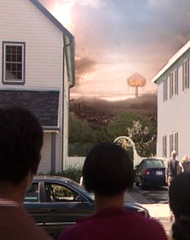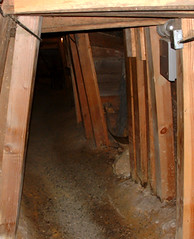Not all Jericho viewers are created equal.
Some fans will spend hours over at CBS Jericho every day. Some enjoy a few minutes a week. Some will never go there at all, preferring any number of forum-based social networks instead. And others, once the show was brought back from cancellation, are simply content to sit on the sidelines until the first episode of a short season 2 unfolds on their television, TiVo, or DVR.
“I was one of the first people to send nuts, well before the efforts were centralized,” one fan told me. “But I’m not really interested in becoming involved in a Jericho group or reading about production. I’m especially not interested in social media dramas.”
Even here, some read our weekly foray into the communication aspects of this case study every week (some of those have no intent of watching the show); some have become daily readers; and others are content to read someone else’s take on whatever we might happen to write about.
It all works for me. But not all of it seems to work for Myles McNutt, author of Cultural Learnings, who offered up his “No Holds Barred” post that claimed there are too many blogs about Jericho.
Close, but not close enough to hit the mark. Still, I don’t fault McNutt for his analysis; he’s pretty sharp on his television critiques, a little less so on social media.
For his evidence, he pointed to Jane Sweat’s THREE Jericho blogs (his emphasis, not mine), saying “while each has some good content, it seems as if they all serve the same basic purpose: promoting Jericho,” he wrote. On closer inspection, each blog has details make all the difference.
Without question, Jericho Monster, is about capturing new viewers while providing original content to the fans. Recently, most of the content has centered on interviews with fans, bloggers, cast members and crew. One of her other blogs, JerichoCentral, tends to lean toward educating fans with news you can use, ranging from how to Digg a Jericho story to promoting the inside scoop from the CBS Jericho site. The third, Arabelle’s Alley, includes information on Jericho, but is more free-spirited, investigative, and broad ranged in terms of what it covers.
From a social media perspective, Sweat has smartly divided her content into specialized niches to better serve unique audiences. It's true. While there is some crossover, each audience is unique. I know because analytics on our blog tell me where Jericho fans come from. Add to her blog efforts, an apparent willingness to her team-up with several other blogs like Jericho On CBS or her participation on the various fan boards like Jericho Rally Point or Radio Free Jericho, and others. All of these, by the way, are different.
That's not to say McNutt is not alone in his assessment. On several occasions, I’ve read active fans on the Jericho CBS forum discuss how centralizing efforts on the network’s site might make sense. But yet, that doesn’t make any sense at all. Why?
Because not all Jericho viewers are created equal, but they all have equal value.
The truth is that many viewers, non-viewers, and even fans will never visit the CBS Jericho site. On the contrary, if they are to be nurtured, they have to be nurtured off the network site by dedicated people who manage bulletin boards, forums, and blogs, with each location gaining 50, 500, or even 5,000 new viewers to become interested in the show. Each one of them also serves as an important promotional outlet for CBS, promoting announcements like the upcoming chat with Dan Shotz next week.
Of course, this is not to say that McNutt is wrong. He is close.
You see, as the conflict caused by the cancellation has waned, some have noted that active fan participation has fallen off. And for some, less visitors means attempting to corral those who are left rather than enticing new viewers like we did with a contest. In other words, some have taken to cannibalizing original content of other blogs and then competing with them by duplicating their ideas. It makes you wonder … what good is a duplicated fan interview on the CBS Jericho site when the only people who will read it are existing die-hard fans?
And this, it seems to me, is where McNutt comes close. If there are any failings with the fan base, it is because they still have not structured a suitable central location to tie everything together. Don’t get me wrong, it was not for lack of trying to launch a fan representative central body. It just did not work. Fortunately, however, there could exist a contingency plan if CBS thinks strategy instead of tactically.
The CBS Jericho Fan Central Blog could reset its objective to round up and promote off-site fan efforts (as opposed to on-site forum discussions) rather than competing over same content (eg. duplicating fan interviews). The CBS Jericho Fan Central Blog might also work with off-site fans to nurture better off-site content instead duplicating these fans' best efforts.
The result would provide for the one-stop shop that is needed, allow CBS site fans to see what off-site fans are doing to round up new and future viewers (with links if you want to know more), and ensure network news like the chat sessions gets out to the public rather than being tied to a site that, frankly, non-viewers are not going to visit. It is not all that far off from what I hoped a central representative fan group might do, but didn’t.

Some fans will spend hours over at CBS Jericho every day. Some enjoy a few minutes a week. Some will never go there at all, preferring any number of forum-based social networks instead. And others, once the show was brought back from cancellation, are simply content to sit on the sidelines until the first episode of a short season 2 unfolds on their television, TiVo, or DVR.
“I was one of the first people to send nuts, well before the efforts were centralized,” one fan told me. “But I’m not really interested in becoming involved in a Jericho group or reading about production. I’m especially not interested in social media dramas.”
Even here, some read our weekly foray into the communication aspects of this case study every week (some of those have no intent of watching the show); some have become daily readers; and others are content to read someone else’s take on whatever we might happen to write about.
It all works for me. But not all of it seems to work for Myles McNutt, author of Cultural Learnings, who offered up his “No Holds Barred” post that claimed there are too many blogs about Jericho.
Close, but not close enough to hit the mark. Still, I don’t fault McNutt for his analysis; he’s pretty sharp on his television critiques, a little less so on social media.
For his evidence, he pointed to Jane Sweat’s THREE Jericho blogs (his emphasis, not mine), saying “while each has some good content, it seems as if they all serve the same basic purpose: promoting Jericho,” he wrote. On closer inspection, each blog has details make all the difference.
Without question, Jericho Monster, is about capturing new viewers while providing original content to the fans. Recently, most of the content has centered on interviews with fans, bloggers, cast members and crew. One of her other blogs, JerichoCentral, tends to lean toward educating fans with news you can use, ranging from how to Digg a Jericho story to promoting the inside scoop from the CBS Jericho site. The third, Arabelle’s Alley, includes information on Jericho, but is more free-spirited, investigative, and broad ranged in terms of what it covers.
From a social media perspective, Sweat has smartly divided her content into specialized niches to better serve unique audiences. It's true. While there is some crossover, each audience is unique. I know because analytics on our blog tell me where Jericho fans come from. Add to her blog efforts, an apparent willingness to her team-up with several other blogs like Jericho On CBS or her participation on the various fan boards like Jericho Rally Point or Radio Free Jericho, and others. All of these, by the way, are different.
That's not to say McNutt is not alone in his assessment. On several occasions, I’ve read active fans on the Jericho CBS forum discuss how centralizing efforts on the network’s site might make sense. But yet, that doesn’t make any sense at all. Why?
Because not all Jericho viewers are created equal, but they all have equal value.
The truth is that many viewers, non-viewers, and even fans will never visit the CBS Jericho site. On the contrary, if they are to be nurtured, they have to be nurtured off the network site by dedicated people who manage bulletin boards, forums, and blogs, with each location gaining 50, 500, or even 5,000 new viewers to become interested in the show. Each one of them also serves as an important promotional outlet for CBS, promoting announcements like the upcoming chat with Dan Shotz next week.
Of course, this is not to say that McNutt is wrong. He is close.
You see, as the conflict caused by the cancellation has waned, some have noted that active fan participation has fallen off. And for some, less visitors means attempting to corral those who are left rather than enticing new viewers like we did with a contest. In other words, some have taken to cannibalizing original content of other blogs and then competing with them by duplicating their ideas. It makes you wonder … what good is a duplicated fan interview on the CBS Jericho site when the only people who will read it are existing die-hard fans?
And this, it seems to me, is where McNutt comes close. If there are any failings with the fan base, it is because they still have not structured a suitable central location to tie everything together. Don’t get me wrong, it was not for lack of trying to launch a fan representative central body. It just did not work. Fortunately, however, there could exist a contingency plan if CBS thinks strategy instead of tactically.
The CBS Jericho Fan Central Blog could reset its objective to round up and promote off-site fan efforts (as opposed to on-site forum discussions) rather than competing over same content (eg. duplicating fan interviews). The CBS Jericho Fan Central Blog might also work with off-site fans to nurture better off-site content instead duplicating these fans' best efforts.
The result would provide for the one-stop shop that is needed, allow CBS site fans to see what off-site fans are doing to round up new and future viewers (with links if you want to know more), and ensure network news like the chat sessions gets out to the public rather than being tied to a site that, frankly, non-viewers are not going to visit. It is not all that far off from what I hoped a central representative fan group might do, but didn’t.

















